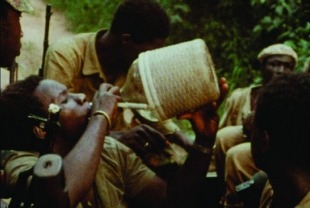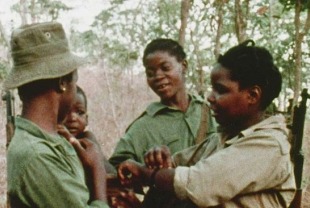In 1961 Frantz Fanon, an Afro-French revolutionary, wrote The Wretched of the Earth, an angry book which revealed the dehumanization of blacks and other peoples suffering under colonialism. He advocated violence as a response to the oppression of the overlords. This documentary is a meditation on Fanon's plea.
After an introduction by Columbia University professor Gayatri Chakravorty Spivak, director Goran Hugo Olsson shows us passages on the screen from nine chapters and a conclusion from the book; these are read by Lauryn Hill. Using archival footage from the 1960s through the 1980s, we see various examples of the cruelty, the hatred, and the violence of colonialists toward Africans in Liberia, Mozambique and Burkina Faso.
While we identify with the anger, the injustice, and the humiliation of these oppressed people, we could not bring ourselves to go along with Fanon's view that the best way to rebel against colonialism is through violence. Instead we recall the courageous and morally difficult practice of nonviolence demonstrated in the lives of Jesus of Nazareth, Mahatma Gandhi, and Dr. Martin Luther King, Jr. They all practiced "the Third Way."
Going Deeper
The Third Way: Loving the Enemy
"It cannot be stressed too much: love of enemies has, for our time, become the litmus test of authentic Christian faith. Commitment to justice, liberation, or the overthrow of opposition is not enough, for all too often the means used have brought in their wake new injustices and oppressions. Love of enemies is the recognition that the enemy, too, is a child of God. The enemy too believes he or she is in the right, and fears us because we represent a threat against his or her values, lifestyle, or affluence. When we demonize our enemies, calling them names and identifying them with absolute evil, we deny that they have that of God within them that makes transformation possible. Instead we play God. We write them out of the Book of Life. We conclude that our enemy has drifted beyond the redemptive hand of God.
"I submit that the ultimate religious question today is no longer the Reformation's 'How can I find a gracious God?' It is instead, 'How can I find God in my enemy?' What guilt was for Luther, the enemy has become for us: the goad that can drive us to God. What has formerly been a purely private affair — justification by faith through grace — has now, in our age, grown to embrace the world. As John Stoner comments, we can no more save ourselves from our enemies than we can save ourselves from sin, but God's amazing grace offers to save us from both. There is, in fact, no other way to God for our time but through the enemy, for loving the enemy has become the key both to human survival in the age of terror and to personal transformation. Either we find the God who causes the sun to rise on the evil and on the good, or we may have no more sunrises."
— Walter Wink in
Jesus and Nonviolence: A Third Way
Special features on the DVD include full preface by Gayatri Chakavorty Spivak



